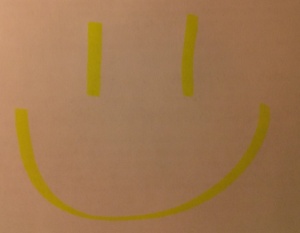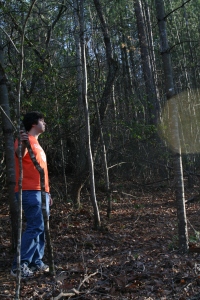My wife and I got a dog recently, and one of the most fun yet terrifying things to do with a new dog is take him to the dog park. The first time we went, all we could think of was all of the things that could go wrong: What if he manages to do a Houdini through that chain link fence? Or doesn’t want to have anything to do with us? What if he likes another family better, and decides to go home with them, and we’re left weeping…?
Ok, that’s admittedly unlikely. But it does cross one’s mind as a paranoid new dog parent. Because the most stand-out feature of a dog park, is that the dog must be let off his
LEASH
We live in a somewhat urban neighborhood. Cars park everywhere, houses are close together, everyone has a beast at the threshold (usually a dog, or cat, or several of both). Doggie danger is lurking around every corner. Leashes exist to keep your dog under firm control in a place where he could probably take care of himself, but just in case you want to be able to jerk him back when it’s clear you know best. That squirrel, for instance, is not worth becoming roadkill- obvious to you, less obvious to your furry friend.
What I discovered at the dog park, though, is that while at first our dog launched himself into the woods and disappeared (cue panic! panic! panic!), his adorable loping self came bounding out of the treeline shortly thereafter. He wanted to make sure that WE were safe (he is, after all, our protector. In his mind.) From then on, he would wander about, sniffing and socializing, doing what dogs doo, and occasionally getting run over by a bigger dog he felt (incorrectly) that he was a match for in size and could outrun. But he would always have an eye towards us to make sure we were available. He would circle back occasionally to smile a hello, and more rarely to snuggle for protection from the aforementioned big dogs (who were, in fact, both bigger and faster- surprise!). The fact that he was “free”, and yet at the end of the day still inexorably “leashed” to us by family connection, got me thinking…
Think of the dog as the average, run-of-the-mill person (don’t get too insulted, our dog is extremely cute- there are worse things I could compare a person to; besides, I’m sure you don’t think of yourself as run-of-the-mill anyway). And think of the person holding the leash, the “owner” if you will, as any large, ideological entity. Examples would include political parties, institutions such as universities, organizations such as (dare I mention it? eh why not) the NRA, or religions (yeah, I went there too).
You probably see where I’m going with this, but let me explain anyway. Many, many people, consciously or not, sit and let one of these entities harness them up and put them on a leash. This isn’t inherently a problem, if the person has chosen to follow the entity. After all, a dog on a leash can’t get lost, and is protected from all sorts of terrible dangers. Our “leashed” persons are protected too, from getting hit by metaphorical cars or bitten by metaphorical snakes. This is great, right? Well, sure, if the “owner” is like us: we unconditionally love our dog (even if he is psychotic at times) and would never lead him astray.
However, one can imagine a scenario with a negligent owner- one who holds the leash but never lets Fido sniff about; or worse, ties his leash to a tree and just leaves him alone for a bit. Or a harsh, punishing owner- one who jerks the leash and uses it against poor Fido (who, bless his heart, just wants to pee on that hydrant). Or even worse, an abusive owner- one who leashes Fido and deprives him of food, or water, or exercise, or makes him fight other similarly abused Fidos who he didn’t actually have any beef with in the first place.
When people “leash” themselves to ideological groups, it is usually (though not always) an expression of personal choice at the beginning. The problem arises when the “owner’s” behavior deviates from the original idea; or the “leash” changes hands without the person’s permission; or the person sees another, potentially much kinder and loving, “owner” across the ideological street but has no hope of going to them. These people might rebel a little in these cases, but they are bound so tightly to the group that their guilt, family, colleagues, or group leadership is able to use the “leash” to pull them back into line.
Nazi Germany and Westboro Baptist Church come to mind as organizations which had/have extraordinarily tight leashes on their followers. These followers, whether they harnessed up voluntarily or when they were too young to know the difference, end up having a hell of a time breaking free from the leash if they decide the time has come for a new owner. Now, obviously, most organizations aren’t quite this astringent to their followers. But we all know people who, for reasons entirely their own, follow organizations with whom they are affiliated blindly, even when we know these people well enough to know that the organization’s direction and their own may not be in sync. That’s the thing about being on a leash. When you’re on that leash, you and your owner are one entity. To attempt to break away is to be a “bad dog”, to one degree or another. Compliance is good, even if it hurts inside.
Now go back to the dog park with me. As I said, our dog will wander about and explore, but it is as if he is still attached to us on a leash- just one that’s much longer and able to pass through inconvenient obstructions like people and trees. But he is still our dog, fiercely loyal and willing to forego even chasing a squirrel to make sure he hasn’t lost us. I have no doubt he’d do the same in the neighborhood. There, the actual leash is necessary to make sure he doesn’t have a momentary lapse and run out into the street; for the most part, he rarely pulls against the leash, since we’re going the same way and doing the same thing anyway. The connection that keeps him around even when he’s free to run is built on love, mutual trust, and respect (insofar as these things are possible for a dog, even a genius dog like ours). I feel sure if we started beating him and yelling at him, that invisible leash would be nonexistent. In that case, I would run too if I was him. Run away and never return.
THE TAKE-AWAY
What I’m trying to get across is that our dog follows us at the dog park because he chooses to do so. We’ve welcomed him into our home and care for him, and in return he stays nearby at the dog park and lets us do invasive things like take him to the vet and give him a bath. People can choose to relate to organizations and ideologies the same way- if you’ve been welcomed, treated well, and have been able to meaningfully contribute to and receive benefit from such an entity, there is no reason for you to run. You can always go sniff out other ideas, and you’re free to judge whether to follow them or to turn up your nose and return home. And if your owner starts to yell or otherwise mistreat you, there is nothing stopping you from escaping a bad situation. In other words,
Choose affiliations which reflect your views and beliefs and which you are proud to associate with. Such a choice should be made independently of external pressures. That way, if your affiliation starts to go down a wrong path, these pressures won’t prevent you from distancing yourself from your “owner” and finding a better fit.
It comes down to being independent and grounded even as you plug into communities. Communities are important- they are necessary to connect with many people who are “like us” on the grounds of interests and beliefs, and at their best can help us learn and grow as individuals in a supportive environment. You can protect yourself, and your reputation, by basing who and what you associate yourself with on your own personal values and beliefs- which are unique to you and your experience- rather than attaching yourself to a belief and holding it because someone told you to.
And for those of you wondering what happens if, flush with your newfound independence, you stray away from an “owner” who actually meant you only good? Here’s a story for you: When we first got our dog, he got off his leash when I had taken him out. I didn’t know the ins and outs of dog ownership yet, and he led me on a merry chase through the neighborhood, dashing in front of cars and getting into all sorts of dangerous (or so it seemed to me) situations in the night. I finally found enough strangers on the streets to corral him. Funnily enough, when he felt like these other people were coming after him (which they were, since I asked them to), he turned and ran back to me and rolled over for a reassuring belly rub.
The point is, the best “owners”- the ones worth being associated with- will keep after you and (at least attempt to) watch over you as you fumble through this process of choosing. And when you run into the dangers of the world and recognize your mistake, they’ll be right there waiting to pick you up and bring you safely home if you choose to return to them.
WHAT’S IT TO YOU?
This topic is near and dear to me because it causes me physical pain when people maniacally defend ideas they know must be wrong, just because some group said it and thus made it “right” in their minds. To agree internally and affiliate based on that agreement is one thing. But to let your affiliations define your beliefs? That’s a different thing altogether, and can be dangerous not only to you, but to society as a whole.
So take a moment and evaluate your own affiliations, even ones you might never have thought to question before. Do you buy into the ideas and actions of the organizations you follow? If not, consider that you might be on a “leash”, and allow yourself to question whether it’s time to break free. Even if you decide to stay, you’ll be glad to know you’re free to chase that squirrel at any time!








